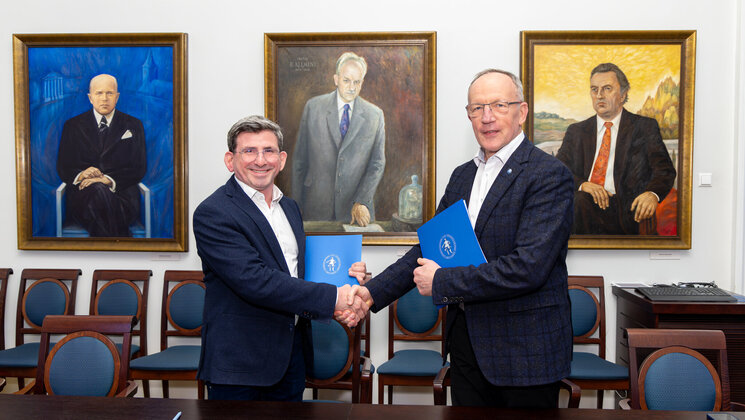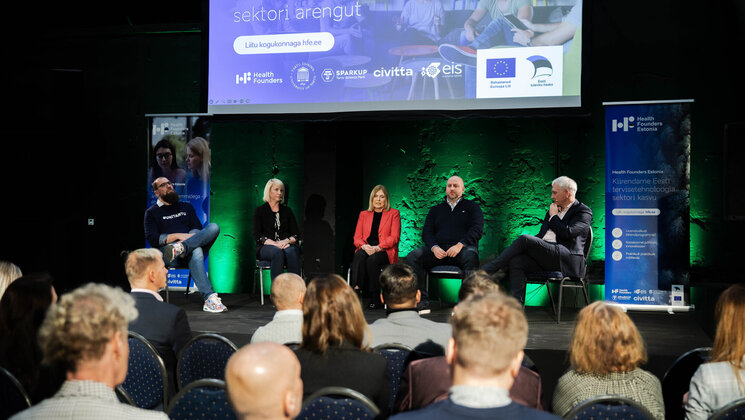University of Tartu introduces deep-tech startup business opportunities at Startup Day

Startup Day, the largest business festival in the Baltics, takes place for the seventh time in the University of Tartu Sports Hall from 15 to 17 March. The University of Tartu, as a co-organiser, participates in the event with a diverse programme, presenting its discoveries that have commercialisation potential and giving a boost to existing spin-offs. For example, the university organises two panel discussions and two pitching competitions, and showcases its spin-offs and innovative services in the demo area.
“I am pleased that both Startup Day and the Estonian government are taking steps to develop deep-tech enterprises on an increasingly wider scale. This field is of key importance for the long-term development of the Estonian economy,” said Mart Maasik, Head of Entrepreneurship at the University of Tartu Centre for Entrepreneurship and Innovation.
The University of Tartu is a seedbed for spin-offs. At Startup Day, the entrepreneurial researchers of the university meet mentors and investors who help them develop their research projects into a deep-tech company. The festival will also present world-famous, inspirational speakers and exciting side events. In the demo area, participants can meet innovative startups.
Panel discussions on deep-tech business development
“How to make deep-tech funding by matching investors’ capital and grants” (in English)
16 March, 11:10–11:35, Insight Stage
Bernd Fesel, CEO of the EIT Culture and Creativity knowledge and innovation community; Heidi Kakko, Ambassador of the European Innovation Council and member of the University of Tartu Council; and Mart Maasik, Head of the University of Tartu Centre for Entrepreneurship and Innovation, discuss private investors’ challenges in investing in research-intensive businesses and how to enhance the impact of these investments with public resources.
“Scientific deep-tech as impact business – possible or still impossible?” (in English)
17 March, 13:00–13:45, Seminars
Aivar Pere, Entrepreneurship Adviser at the University of Tartu Centre for Entrepreneurship and Innovation; Peter Alešnik, Head of Spinout & Spin-off Support at the University of Ljubljana; Valentin Schmitt, Investment Manager at Better Ventures, and Consultant Mart Repnau discuss whether and how deep-tech companies could have a positive impact on society and the environment.
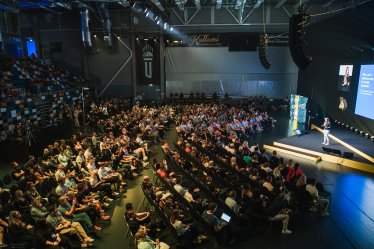
Research-intensive business opportunities and students’ best business ideas are presented at the pitching competition
At Startup Day, the University of Tartu organises two pitching competitions that present deep-tech companies and students’ business ideas. In addition, the university spin-offs participate in Startup Pitching.
16 March, 12:00, Pitching Stage
Among the top 40 startups, the university spin-offs UpCatalyst, Vectiopep and Gearbox Biosciences participate in the Startup Pitching competition. The best five teams in the semi-finals progress to the finals held on 17 April, the last day of the business festival, to compete for the 200,000-euro investment from EstBAN. In addition, .Cocoon Ventures awards a 100,000-euro investment.
The winner of the last year’s Startup Pitching was LightCode Photonics, set up by Heli Valtna, a researcher at the University of Tartu.
16 March, 16:00, Pitching Stage
Seven teams of the University of Tartu participate in the pitching competition of Nordic university spin-offs.
17 March, 15:00, Pitching Stage
“Kaleidoskoop” is the largest student business ideas pitching competition in South Estonia. It is organised by the University of Tartu Startup Lab. The best student teams in the Delta X competition will compete. More information about the teams is available on the University of Tartu website.
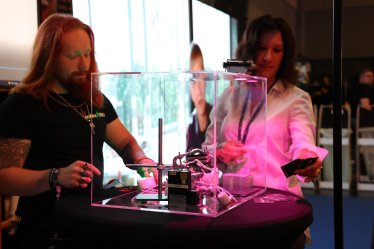
Demo area showcases technology created by university researchers and tells the success stories of business cooperation
Several university spin-offs that provide solutions to societal problems through cutting-edge science introduce themselves to the public in the festival demo area. For example, Silklytics OÜ is developing a test to determine the micronutrient content of soil and plants, and RedoxNRG OÜ produces green fuel from carbon dioxide.
Silklytics is developing a novel microfluidic technology based on porous materials. As their solution enables affordable chemical analysis, the company plans to apply it in both agriculture and laboratory medicine. In agriculture, the measurement of micronutrient content in plants and soil is essential, so farmers know which fertiliser to use and in what amounts. In medicine, the technology can be applied to determine biotin (vitamin B7) levels in human blood. In the Startup Day demo area, Silklytics will showcase the prototypes of the analysis chip and reader they have developed. Their solution is convenient as it does not require sophisticated instruments, additional apparatus or knowledge.
RedoxNRG uses renewable energy to capture carbon dioxide electrochemically directly from the air, thus contributing to a circular economy and climate neutrality. They use the captured CO2 to make formic acid, which can be used in many areas of life. For example, it can be used as a convenient and safe hydrogen energy storage, for applications in the cosmetics, food and textile industries, as well as in RedoxNRG’s own work.
High levels of nitrogen are released into groundwater and watercourses from fertilisers, and this is damaging to the water quality. Scientists have found a way to remove pollutants by boosting natural processes, known as bioremediation. Namely, they apply bioelectrochemical methods to accelerate the activity of microbes that degrade nitrogen pollution, making water treatment more efficient. The process also generates energy, which, in turn, reduces the overall cost of the process.
The new method aims to develop a full-scale bioelectrochemical system, which allows the best use of the high potential of the treatment process to ensure clean drinking water.
The method is introduced at Startup Day by a participant of the spin-off programme, Associate Professor in Environmental Microbiology Mikk Espenberg.
Esadres, which is founded by scientists of the University of Tartu, develops personalised wound care products for the prevention and treatment of wound infections and chronic wounds.
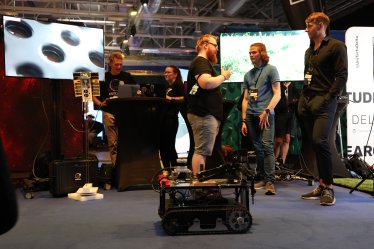
New scientific discoveries offer good business opportunities
In addition to the existing spin-offs, the University of Tartu will present research results and services with high business potential in the Startup Day demo area.
In the Startup Day demo area, the Institute of Computer Science introduces the possibilities of high-performance computing. Artificial intelligence for image processing is used as an example. Users can generate an image of their choice and compare the processing speed to a normal computer’s capacity.
Tartu Observatory will present its new lunar rover model in the Startup Day demo area. It is possible to make the rover drive on the virtual moonscape. Those interested can drive the rover using a remote and see on the screen how it moves on the virtual surface of the Moon.
The university’s marketing researchers, led by Andres Kuusik, introduce the work of the best eye-tracking laboratory in the Baltics. Visitors can test the eye-tracking glasses that researchers use to study the movement of people’s eyes on the screen of computers and smart devices, as well as in the physical and virtual environment.
The Creative Destruction Lab (CDL) is an international business accelerator which offers a programme for early-stage research- and technology-based companies with high growth potential. Their nine-month programme enables participants to learn from experienced entrepreneurs and increase their chances of success.



